Prof. Dr. Yiman Wang

Fellow in the project "Epochal Lifeworlds: Narratives of Crisis and Change"
Short Biography
Yiman Wang is Professor of Film & Digital Media and Kenneth R. Corday Family Presidential Chair in Writing for Television & Film (2022-2025) at University of California, Santa Cruz. She is author of Remaking Chinese Cinema: Through the Prism of Shanghai, Hong Kong and Hollywood (2013). Her NEH-supported monograph on Anna May Wong, the pioneer Chinese American screen-stage-television performer, is forthcoming. She is co-editor of the Global East Asian Screen Cultures book series published by Bloomsbury, and has published numerous articles in journals and edited volumes on topics of Chinese cinema, independent documentary, ethnic border-crossing stardom, ecocinema, film remakes and adaptation.
Her articles have appeared in journals such as Feminist Media Histories, Quarterly Review of Film and Video, Film Quarterly, Camera Obscura, Journal of Film and Video, Positions: Asia Critique, Journal of Chinese Cinemas, and in edited volumes including Chinese Films in Focus (Chris Berry ed. 2003, 2008), Idols of Modernity: Movie Stars of the 1920s (Patrice Petro ed. 2010), The New Chinese Documentary Film Movement: For the Public Record (Chris Berry et. al. eds. 2010), Silent Cinema and the Politics of Space (Jennifer Bean et. at. eds. 2014), and China’s iGeneration: Cinema and Moving Image Culture for the Twenty-First Century (Matthew D. Johnson et. al. eds. 2014), American and Chinese-Language Cinemas: Examining Cultural Flows (Lisa Funnell, Man-Fung Yip eds., 2014), New Silent Cinema (Katherine Groo and Paul Flaig eds. 2015), A Companion to Wong Kar-wai (Martha P. Nochimson ed. 2015), The Multilingual Screen: New Reflections on Cinema and Linguistic Difference (Tijana Mamula, Lisa Patti eds. 2016), Filming the Everyday: Independent Documentaries in Twenty-First-Century China (Paul Pickowicz and Yingjin Zhang eds. 2017), Revisiting Star Studies: Cultures, Themes and Methods (Sabrina Qiong Yu and Guy Austin eds. 2017), and Vamping the Stage: Female Voices of Asian Modernities (Andrew N. Weintraub, Bart Barendregt eds. 2017), At Translation’s Edge (Nataša Durovicova, Patrice Petro, Lorena Terando eds. 2019), Abjection Incorporated: Mediating the Politics of Pleasure and Violence (Maggie Hennefeld and Nicholas Sammond eds. 2020), The Fantastic in Chinese Cinema (Andrew Stuckey and Kenneth Chan eds. 2021), Kedi: A Docalogue (Jaimie Baron, Kristen Fuhs eds. 2021), and Theorizing Colonial Cinema: Reframing Production, Circulation, and Consumption of Film in Asia (Aimee Nayoung Kwon, Takushi Odagiri, Moonim Baek eds. 2022).
Project
Mediating Climate Change in P. R. ChinaThis project looks at how China’s climate policies and practices have been depicted and narrated, and how a future environment has been envisioned in Chinese-language live action and animated media works from the socialist era to the present day. The climate discourses produced by these media works cover a wide spectrum, from resource utilization (e.g., maximizing the affordances of different agricultural climate regions), terra-engineering strategies (e.g. the tree-planting campaigns to remedy local environmental degradations), to global environmentalism (e.g. planetary collaboration on sustainable growth), and apocalypse (e.g. speculative presentation of mass species extinction and environmental devastation). This project examines how these diverse climate imaginaries have been presented and constructed with film and media technologies since the socialist era. By juxtaposing archival footage and historical science education films with the present-day media works, I aim to address four sets of questions. First, I delineate what the media works tell us about the shifting understandings of human-environment relationships across space and history, and how such understandings both give rise to specific policies and practices and might also come to be questioned as a result of such practices. Second, I ask how different media technologies, modes of production, and audience interactions facilitate the construction of certain climate discourses while obstructing others. Third, I consider the ways in which photochemical media technologies have been adapted to local weather conditions (such as lighting and humidity), suggesting that mediamaking itself constitutes micro-scale yet consequential environmental practices. Fourth, I study how these Chinese-language audiovisual media works interact with similar films produced in other countries so as to place China’s climate imaginaries in an interconnected and comparative framework that governs not only the well-recognized age of globalization but also the supposedly divided Cold War era. My project conjoins environmental humanities, film and media studies (especially ecocinema studies), and China studies to illuminate the mutual constitution between audiovisual media and climate imaginaries. I suggest that mediamaking and climate practices are intertwined and analogous. They both rely on time unfolding at variant speeds to produce continuity, change, crisis, and responses. Pairing media and climate practices can, therefore, offer us a new framework for grappling with the history and future of our escalating climate change, and the roles humanist scholars could play by innovating ways of mediating climate change and worldmaking.
